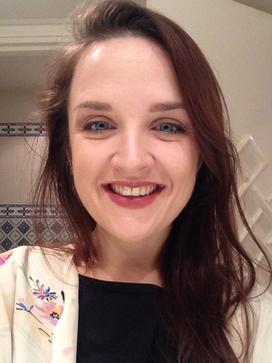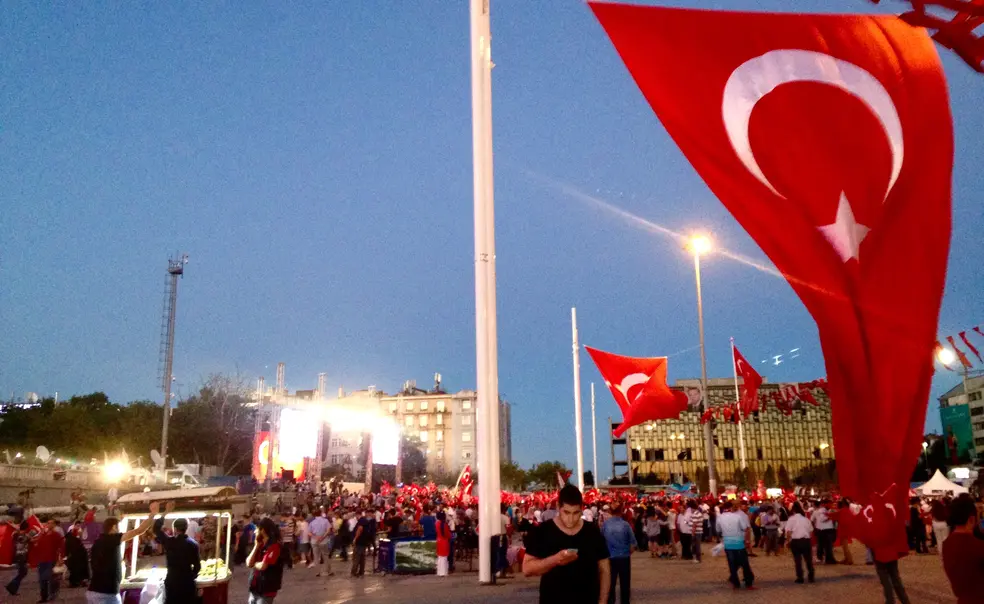Life seemed normal on the precipice of chaos.
This year, July 15 in Istanbul came and almost went like any other day. After my Turkish class, I rode a crowded tram to Eminönü and hiked to the Suleimaniye Mosque, gnawing a chocolate-filled poğaça. On an open-air terrace with a spectacular view of the cleft between two continents, I sipped black mulberry juice from a mason jar with a curly straw. Later, I sampled too-sweet baklava with my professor’s friends. When darkness fell I was at my apartment, debating prices for eyebrow threading with my Turkish roommates.
At 8:30 p.m., I dashed out to meet friends in the neighborhood. The atmosphere in the crowded alleys of central Beşiktaş was Friday-evening festive, ordinary.
We sat down to eat at 10 and were weighing the merits of the Turkish raw meat dish çiğ köfte when someone received a Twitter alert. The army had blocked the two bridges connecting Europe and Asia. Maybe a terrorist threat, I thought. We ordered. We had barely dipped into our pitcher of misty-white rakı when reports began suggesting that a coup was underway. Our fellow diners stared at their phones and murmured.
Music was playing from a sidewalk speaker; it was “Hey Jude.”
Naaaa-na-na na-na-na-na. Na-na-na-na…
We abandoned the rakı and hurried home. It was just after 11. I saw no one in uniform in the streets. Some people still lounged in cafes as if nothing were happening at all.
I joined my roommates in front of the TV. We didn’t move for hours. “Was this expected?” I asked. “Did I miss something?”
“We had no idea,” they said. “We thought Erdoğan had control of the army.”
My roommate went down the street to buy extra food and withdraw cash. Everywhere, the lines were now long.
A sweaty news anchor read a prepared statement. The army was taking over in the name of democracy, she said. We began to hear F-16s flying low overhead.
More than anything else, the strident rumble of the jets reminded me of Egypt, where I was living in 2013. But there, then, we knew the coup was coming: On the morning of July 3, I passed an armored personnel carrier in the square near my Cairo apartment, waiting for orders. A countdown in the corner of the television screen even marked the hours. In Istanbul, though, the coup was completely incongruous with the day that preceded it.
We watched as President Erdoğan FaceTimed with a news anchor from an “undisclosed location.” He called his supporters to the streets. They went.
Around 2 a.m., we began to hear gunfire crackling like popcorn in the distance — perhaps on the bridge just over a mile away. We rushed to the window. Immediately there was a salvo of squawks, and a flock of white seagulls scattered across the night sky. Whirring helicopters swooped low over the rebel tanks that occupied the bridge. Like us, our neighbors hovered at their windows.
Around 3 a.m. I drifted off, fitfully. Within minutes, a thunderous sonic boom shook me awake. Our apartment quaked. I leaped from bed yelling and ran into the hall. My roommates, equally terrified, joined me. We lingered for a few minutes, looking for a place to hide. “Stay away from the windows,” we kept instructing each other. It seemed certain there would be more F-16s and more explosions and we had nowhere to go.
On television we watched as the army occupied the studio of CNN Türk. The anchor’s seat was empty. There was chanting in the background, and gunshots. We stared at the empty chair for a long time and waited.
Eventually I slept. By morning, the coup had failed. The soldiers who had arrested the police by night were themselves in handcuffs at dawn. Twelve hours earlier, they had rolled from their barracks for what they believed was a drill. Now, these teenagers’ helmets littered the bridge like upended buckets.
I went out in the late afternoon. Already the violent pulses of the night had evaporated into a sweltering day-after. The skies were quiet. Improbably, shops were open and public buses ran for free. That night, the slam of a car door, the crunch of trash thrown into the dumpster, and the fuzzy hum of the neighbors gossiping outside the corner shop were once again all there was to hear.
Soon the streets were wrapped in crimson and crescents. In Taksim Square, an Ottoman battle hymn played from loudspeakers and food trucks handed out free döner kebab to lines of hundreds. A friend and I watched from the sidewalk as our neighbors marched in the streets. “Long live democracy!” they cheered.
Behind this curtain of elation, thousands were arrested. The president announced a state of emergency and warned of “traitorous terrorists” in our midst. All Turkish scholars were banned from leaving the country. The swell of public enthusiasm for democracy that at once foretold a more authoritarian future echoed my final weeks in Egypt three years earlier, and left me with a familiar unease. The Egyptian coup succeeded and El-Sisi still rules today. Yet then and there, as here and now, there was no good choice — not military rule, not an elected authoritarian government, not silence.
As a historian-in-training, I felt the impulse in both places to look to history for explanations. But historic moments are messy and uncertain. Later, when we write about events, we invent coherent stories with a beginning, a middle, an end, and an argument. But living through a coup — or two — has reminded me that history begins with confusion.

This is the first essay in a new series at PAW Online. If you would like to contribute to the series, contact us at paw@princeton.edu.












No responses yet